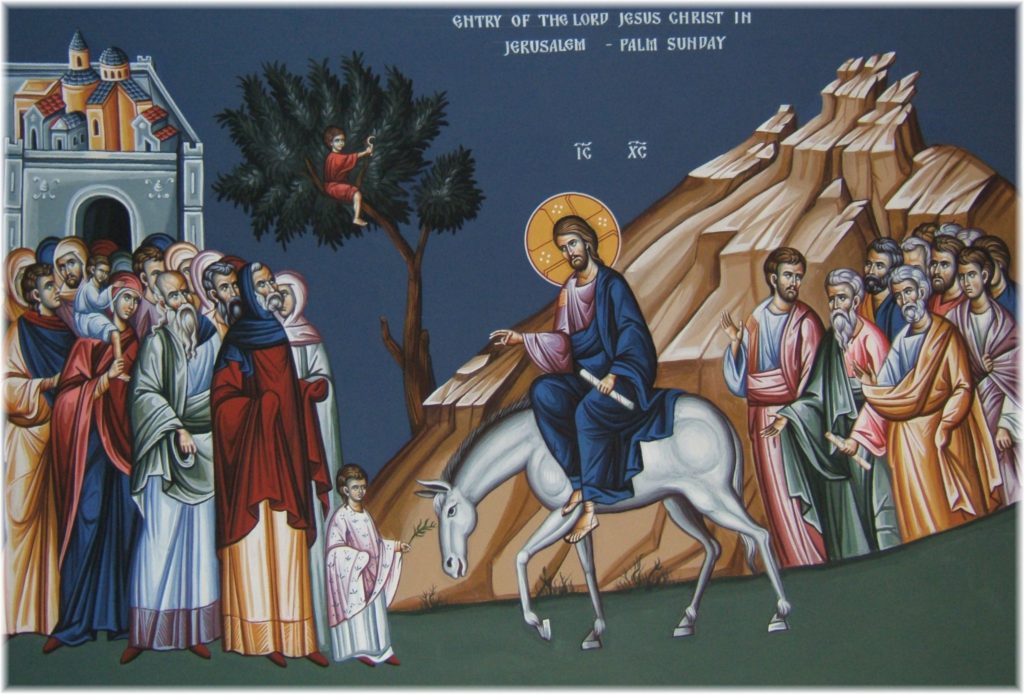If you, even you, had only recognized on this day
Luke 19:42
the things that make for peace!
But now they are hidden from your eyes.
As a child, I quietly harboured an uneasy dislike for Palm Sunday: the processions, the palm waving and the triumphant chorus, “Blessed is he who comes in the name of the Lord. Hosanna! Hosanna in the highest!” Easy triumphalism bothered me then, and it bothers me still. Have people forgotten what came after this brief moment of collective credulity? Can we not still see ominous broiling thunderclouds on the horizon? How can we celebrate without tears?

Jesus didn’t celebrate without tears. His royal entry into Jerusalem was presumably staged from Bethany, the home of Lazarus. If you recall the last chapter of Pilgrim Year: Lent, you’ll remember that Lazarus means “the Lord helps,” and Bethany means “the house of misery.” Together, these titles suggest the coming kingdom of Christ to be a great reversal of earthly kings and kingdoms known for feasting on the misery of others. As it is, the record of Jesus’ ministry is filled with evidence of a profound divine compassion for the marginalized and downtrodden, as well as an absolute rejection of power as it would have been understood and wielded in his day, and often in ours.
So Luke’s Gospel reports that Jesus, in the midst of all the revelry, suddenly burst into tears that clearly lay just below the surface of his unlikely triumph. “If only you knew what makes for peace,” he moans. “But you can’t see it!”
Jesus, knowing that the kingdom of peace will be resisted with ferocious violence, weeps while the multitudes sing and dance. This sober display certainly influences the Church’s yearly tradition of keeping the fronds of Palm Sunday to burn the next year, and then use their ashes to trace a cross on the foreheads of the faithful come the following Ash Wednesday. For another year has passed, and we still do not understood what makes for peace. We still can’t see it.
This day brings forth other troubling things to consider. It seems that Jesus’ descent from the Mount of Olives to Jerusalem was a staged provocation of his enemies, deliberately orchestrated to draw the ire of the religious authorities and raise the eyebrows of the Roman Empire. Consider a prophecy that would have been well known to Jesus and all observant Jews:Rejoice greatly, O daughter Zion!
Shout aloud, O daughter Jerusalem!
Zechariah 9:9
Lo, your king comes to you;
triumphant and victorious is he,
humble and riding on a donkey,
on a colt, the foal of a donkey.
Jesus would have been well aware of Zechariah’s prophecy, as all Jews anticipating the arrival of the coming Messiah would have been. For readers unfamiliar with the Hebrew prophecy, it was customary in the ancient Near East for victorious kings to ride on a war horse into their royal city on a bed of palm leaves. Much to the insult of the Roman authorities, Jesus didn’t even have the courtesy to arrive on a war horse, but rode a donkey instead, symbolizing victory already won and the coming of a new peace. It is hard to imagine the Romans feeling threatened in any real way – more likely bemused, provoked and annoyed. They couldn’t have known that this laughable challenge to brute power would, within a few hundred years, quietly undermine and undo the empire and the entire pagan religious system that justified it.
Despite its sombre and contentious undertones, the message of Palm Sunday is still cause for celebration. The celebration is for those who can see through the radical humiliation and cross of Christ to the resurrection and way of peace towards which Christ’s incarnation, life, teachings, miracles and death all point. This is a time to consider the ways we may yet be complicit with the empire of death and the culture of death. Realizing our complicity allows us to turn and align our allegiance with the humble one who rode into magnificent defeat on behalf of all who long for a better kingdom.
PALM SUNDAY
by Malcolm Guite
Now to the Gate of my Jerusalem,
Malcolm Guite, Sounding the Seasons: Seventy Sonnets for the Christian Year (Canterbury Press, 2012), 32.
The seething holy city of my heart,
The saviour comes. But will I welcome him?
Oh crowds of easy feelings make a start.
They raise their hands; get caught up in the singing,
And think the battle won. Too soon they’ll find
The challenge, the reversal He is bringing
Changes their tune. I know what lies behind
The surface flourish that so quickly fades;
Self-interest, and fearful guardedness,
The hardness of the heart, its barricades,
And at the core, the dreadful emptiness
Of a perverted temple. Jesus come
Break my resistance and make me Your home.
PEACE PRAYER (Prayer of St. Francis)
music and lyrics by John Foley, SJ
Lord make me a means of Your Peace
Where there’s hatred grown
Let me sow Your love
Where there’s injury Lord
Let forgiveness be my sword
Lord make me a means of Your PeaceLord make me a means of Your Peace
When there’s sadness here
Let me sow Your joy
When the darkness nears
May Your light dispel our fears
Lord make me a means of Your PeaceLord grant me to seek and to share
Less to be consoled
Than to help console
Less be understood
Than to understand Your good
Lord make me a means of Your PeaceLord grant me to seek and to share
Appears on the 2000 CD release: Steve Bell / Simple Songs
To forgive in Thee
You’ve forgiven me
For to die in Thee
Is eternal life to me
Lord make me a means of Your Peace